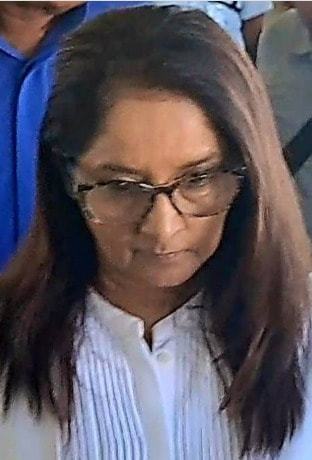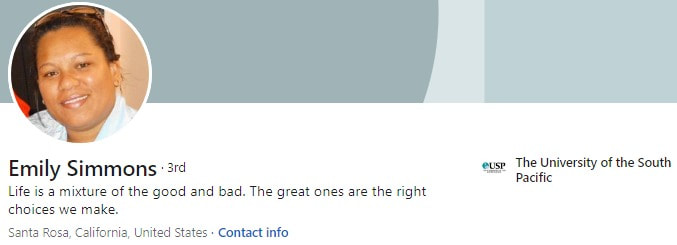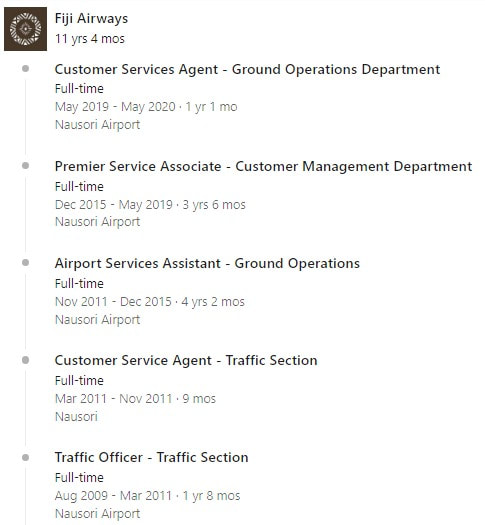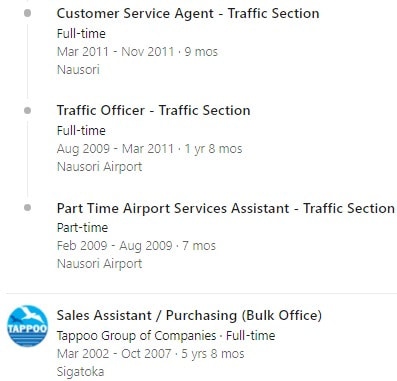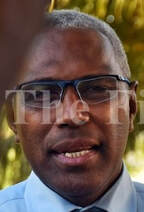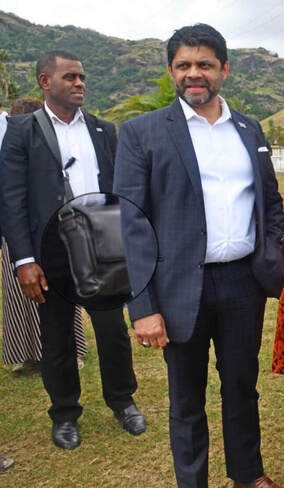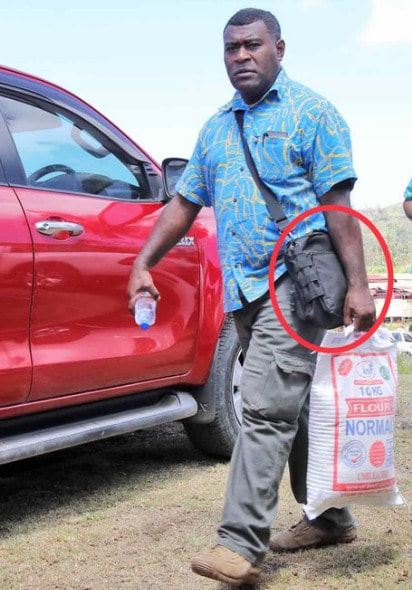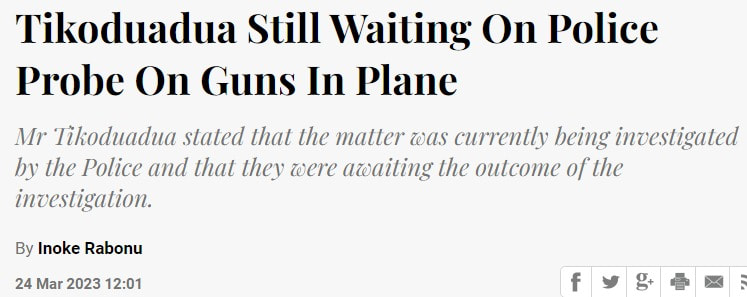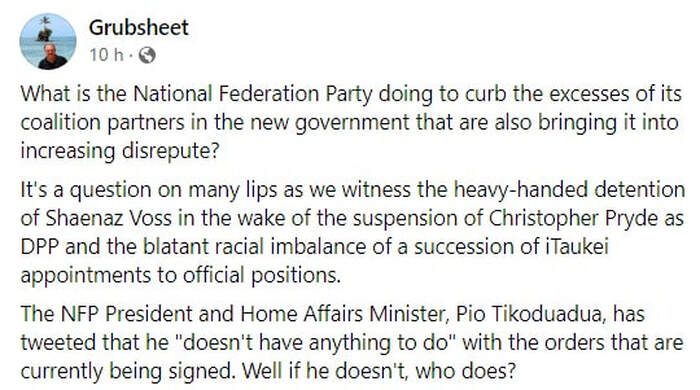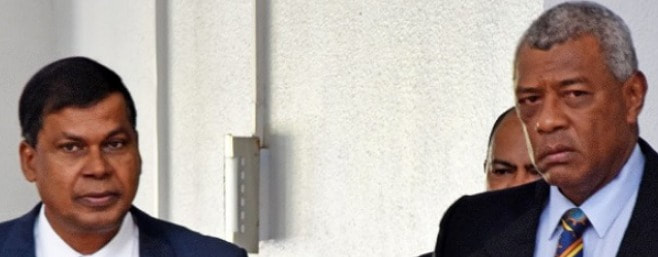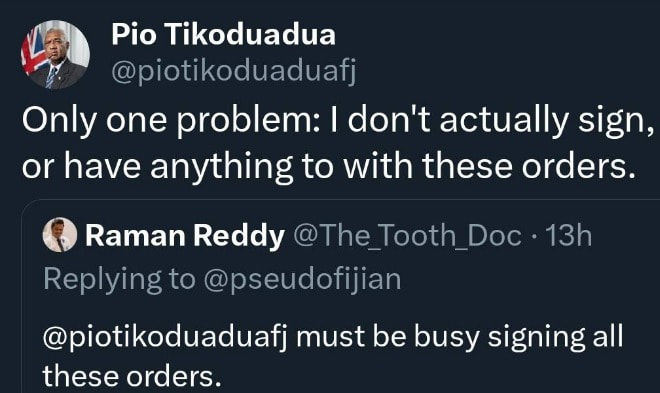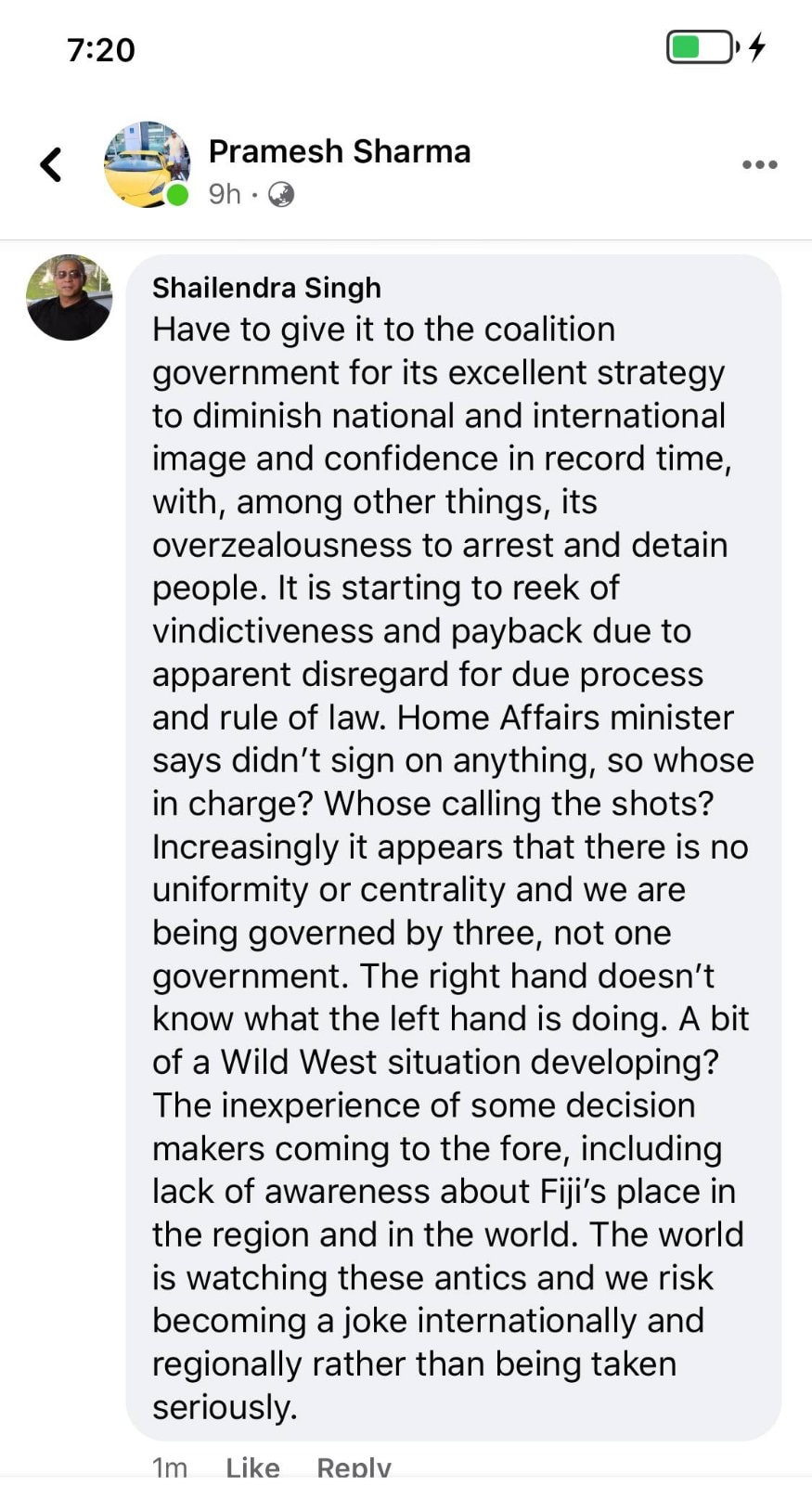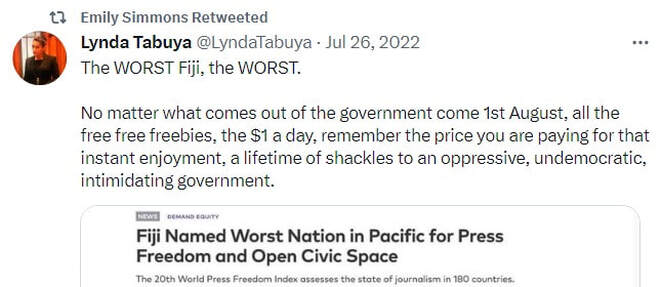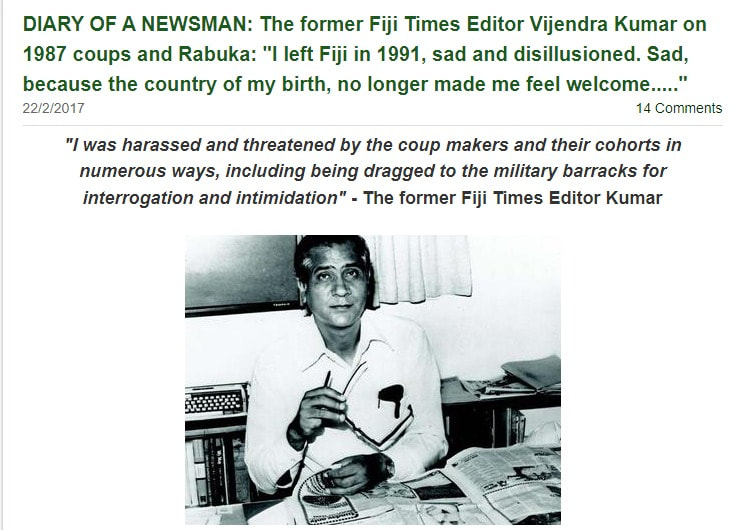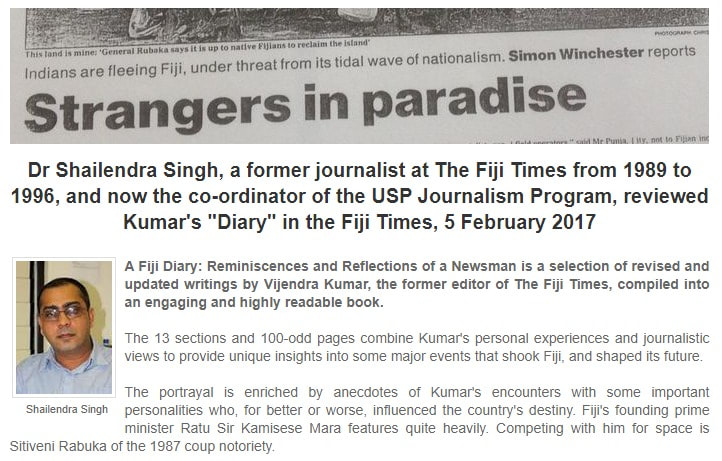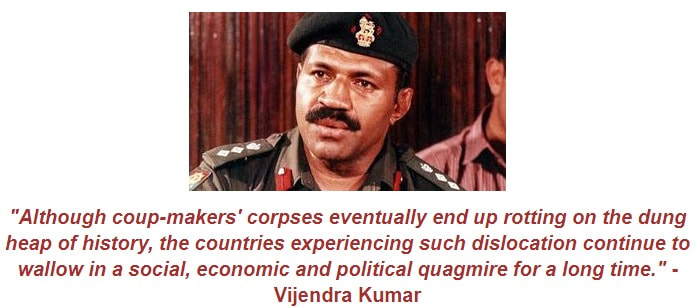| Retired Fiji Link CEO Shaenaz Voss has pleaded not guilty to a charge of failure to comply with the requirements of the operator’s airline security programme and has been granted bail by the Nausori Magistrates Court. Voss has been charged in relation to unlawful carriage of firearms on board a flight from Nausori to Labasa Airport on 8th October, 2018. |
| Fiji Airways staff say bodyguards for former attorney-general Aiyaz Sayed-Khaiyum were allowed to carry guns onto Fiji Link domestic flights when he was a passenger without Civil Aviation Authority of Fiji (CAAF) approval. Current and former airline ground staff have told this newspaper they were directed by Fiji Airways senior management to allow the guns to be carried in the cockpit of Fiji Link aircraft, even though approvals from CAAF had not been obtained. |
Emily Simmons, a former member of Fiji Link’s Premier Service team, told the Fiji Times that Fiji Airways staff had initially raised concerns when Khaiyum’s bodyguards carried firearms on board domestic flights.
“The proper procedure is that we must see or be given written approval from CAAF and the airline, and once this has been satisfied, the magazine (the part of the gun holding bullets) must be ejected and stored separately from the weapon in the cargo hold. But every time the former A-G and his bodyguards travelled, we were told by a very senior executive to allow the weapons onboard and for them to be kept in the cockpit with the pilots. We knew this was a breach but we couldn’t do anything about it because we needed our jobs. To my knowledge, we were never shown a written approval from the airline or CAAF (Civil Aviation Authority of Fiji). We were just told verbally to allow it.”
Mr Turaga said the authorities would need to look into the legality of the bodyguards’ firearms being carried on the flights.
The police confirmed yesterday that they had begun an investigation, which included an interview of The Fiji Times reporter Felix Chaudhary, whose story was published on Tuesday.
Chief of Intelligence, Investigations and Prosecutions, Assistant Commissioner of Police Sakeo Raikaci confirmed a report to the police had been lodged yesterday.
“The matter is under investigation,” he said.
The police confirmed yesterday that they had begun an investigation, which included an interview of The Fiji Times reporter Felix Chaudhary, whose story was published on Tuesday.
Chief of Intelligence, Investigations and Prosecutions, Assistant Commissioner of Police Sakeo Raikaci confirmed a report to the police had been lodged yesterday.
“The matter is under investigation,” he said.
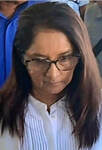
Retired Fiji Link CEO Shaenaz Voss has pleaded not guilty to a charge of failure to comply with the requirements of the operator’s airline security programme and has been granted bail by the Nausori Magistrates Court.
Voss has been charged in relation to unlawful carriage of firearms on board a flight from Nausori to Labasa Airport on 8th October, 2018.
Police say this is the case relating to the bodyguards of the former Attorney General, Aiyaz Sayed-Khaiyum allegedly carrying firearms on the Fiji Link flight.
According to the particulars in her charge sheet, Voss on the 8th of October in 2018 at Nausori Airport, being the Chief Executive Officer of Fiji Link failed to comply with the requirements of Fiji Link Operation Airline Security programme on board domestic Flight FJ32.
Magistrate Shageeth Somaratne granted bail on a personal bail bond of $10,000, two sureties and other conditions including reporting at her nearest police station on the last Sunday of every month, not to reoffend and not to interfere with the witnesses.
DPP lawyer, Meli Vosawale did not object to bail and said that standard bail conditions can apply.
Voss is represented by R Patel lawyers Devanesh Sharma and Gul Fatima.
Her sureties are her brother, Steven Khan and friend Peter Mazey. Police Chief of Intelligence, Investigations and Prosecutions, ACP Sakeo Raikaci says 63-year-old Voss was arrested on Saturday from the Nadi International Airport.
ACP Raikaci says Voss was interviewed under caution on Saturday through Video Recorded Interview and kept in police custody for the continuation of her interview yesterday and was further kept in custody for the completion of her interview this morning.
He says she was charged after consultation with the Office of the Director of Public Prosecutions.
ACP Raikaci says Voss was out of the country when investigation was initiated until recently when she arrived last Friday.
He has once again reassured members of the public that there will not be any influence from senior police officers as well as political masters in the process of investigating cases of national interest.
ACP Raikaci adds all investigations will be conducted thoroughly and fairly, therefore they once again plead for patience and understanding as there are processes and procedures that have to be followed and complied with accordingly. Source: FijiVillage News
Voss has been charged in relation to unlawful carriage of firearms on board a flight from Nausori to Labasa Airport on 8th October, 2018.
Police say this is the case relating to the bodyguards of the former Attorney General, Aiyaz Sayed-Khaiyum allegedly carrying firearms on the Fiji Link flight.
According to the particulars in her charge sheet, Voss on the 8th of October in 2018 at Nausori Airport, being the Chief Executive Officer of Fiji Link failed to comply with the requirements of Fiji Link Operation Airline Security programme on board domestic Flight FJ32.
Magistrate Shageeth Somaratne granted bail on a personal bail bond of $10,000, two sureties and other conditions including reporting at her nearest police station on the last Sunday of every month, not to reoffend and not to interfere with the witnesses.
DPP lawyer, Meli Vosawale did not object to bail and said that standard bail conditions can apply.
Voss is represented by R Patel lawyers Devanesh Sharma and Gul Fatima.
Her sureties are her brother, Steven Khan and friend Peter Mazey. Police Chief of Intelligence, Investigations and Prosecutions, ACP Sakeo Raikaci says 63-year-old Voss was arrested on Saturday from the Nadi International Airport.
ACP Raikaci says Voss was interviewed under caution on Saturday through Video Recorded Interview and kept in police custody for the continuation of her interview yesterday and was further kept in custody for the completion of her interview this morning.
He says she was charged after consultation with the Office of the Director of Public Prosecutions.
ACP Raikaci says Voss was out of the country when investigation was initiated until recently when she arrived last Friday.
He has once again reassured members of the public that there will not be any influence from senior police officers as well as political masters in the process of investigating cases of national interest.
ACP Raikaci adds all investigations will be conducted thoroughly and fairly, therefore they once again plead for patience and understanding as there are processes and procedures that have to be followed and complied with accordingly. Source: FijiVillage News
Below is a pungent Facebook comment by the Head of Journalism at USP, Dr Shailendra Singh, in which he credits the government with "diminishing its national and international image in record time "through its "apparent disregard for due process and rule of law".
As Shailendra Singh puts it:
"The world is watching these antics and we risk becoming a joke internationally and regionally".
It is a warning shot from a distinguished and influential educator that the NFP, in particular, ignores at its peril.
“I left Fiji in 1991, sad and disillusioned. Sad, because the country of my birth, where our ancestors’ bones lie interred, no longer made me feel welcome. Disillusioned because a nation once internationally hailed as a peaceful paradise and a showcase for democracy and multiracial harmony turned out, in the end, to be a purgatory for half its people. For beneath the thin veneer of a civilized and enlightened society lurked serious undercurrents of racial tension and hostility.” - Vijendra Kumar
At the narrative's heart are the vivid accounts of Kumar's remarkable life story while growing up in Nadi. What emerges is a fascinating portrait of the simplicities as well as the complexities of a life lived in Fiji — a depiction many Fijians would readily identify with.
Kumar started in journalism humbly enough: as a self-taught, underpaid, and sometimes unpaid proofreader cum reporter/editor of the National Federation Party (NFP) mouthpiece, the weekly Pacific Review.
Duties included errands to collect editorial copy from party leader, the late AD Patel's home. In the book, the prominent Nadi lawyer comes across as somewhat snooty — a pukka sahib in Kumar's words — and rather tardy with deadlines, often giving Kumar the runaround.
When he plucked the courage to ask for his pay, Kumar was shown the empty office till. On a lucky week, he received $25. This saw Kumar take up high school teaching, a job he stuck with for 12 years, before returning to his true calling as a reporter, but this time at The Fiji Times, in 1969.
Within six years, Kumar had become the first local editor at the iconic national daily, up until then largely an expatriate stronghold. His resignation in 1991 and subsequent migration to Australia was a consequence of Fiji's first coup in 1987. Kumar dwells on the coup at length, which is hardly surprising, since the coup's impact was not just stunning, but also enduring. The trauma was felt deeply, both at the national and personal levels.
During his time in Australia, Kumar served as a subeditor at the Courier Mail in Brisbane, before retiring in 2001. It was a remarkable journey for a descendent of Indian indentured labourers; one who left home at the tender age of six to live with his aunt to gain access to better education.
Kumar's insights matter: As the editor of The Fiji Times, he was at the vantage of major developments in the country's history, observing them unfold, interpreting them, and reporting their impacts nationally.
In the first chapter, "Goodbye to Paradise", it's apparent that even a newspaperman like him was taken in by Fiji's relative post-independence calm. The mirage was shattered by the 1987 Sitiveni Rabuka nationalist coup. In Kumar's view, the coup turned Fiji into a "purgatory for half its people".
The post-coup media crackdown created a precarious environment for journalists. Kumar writes that the editorship was always a "hot seat" but after the coup the "heat became almost unbearable". After four years of "harassment, intimidation and outright threats", he felt that he could no longer discharge his professional duties with "honesty and without fear".
Kumar expresses disappointments and regrets without rancour. His measured analysis demonstrates an astute knowledge of Fiji politics and a deep respect for Fijian culture. "The Fall of a Titan" was his tribute to Ratu Mara after his death in April 2004.
Kumar notes that the Rabuka coups not only signalled the death of democracy, but also the fall of a titan in Ratu Mara, who hastened his own demise by failing first to condemn the coup, and then, by leading the post-coup regime.
Coups are by nature replete with irony. Mara was accused of being behind the very coup that, in the eyes of many, tarnished his record. The suspicions were fuelled by none other than a brooding Rabuka, who said he felt used and betrayed by the coup's unseen power-brokers.
In Kumar's view, Ratu Mara "dedicated his life to his country" and will be "kindly judged by history. The Pacific Island states have produced no greater son," he writes. But Ratu Mara critics, who accuse him of a litany of sins — ranging from racism to corruption, and crony capitalism to political opportunism — would strongly disagree with Kumar.
Like many a leader, Ratu Mara was a controversial figure. The team of reporters that Kumar headed did not spare Mara, even though Kumar had gotten to know him personally. If Kumar's portrayal in the book sounds more forgiving, it's probably because of hindsight and reflection. His evaluation possibly stems from a more holistic analysis of Ratu Mara's record, and a healthier appreciation of the frailties of human beings. Even Gandhi is reported to have had skeletons in his closet.
Ratu Mara tried to be a political centrist, and if he failed, the fault wasn't his alone. The middle ground in an ethnically-divided country like Fiji is a precariously fine line. It's a slippery slope that has claimed quite a few political scalps, such as the doomed multiracial coalition headed by opposition leader Jai Ram Reddy and Prime Minister Rabuka in 1999. Rabuka's fall in particular added to the ironies of the 1987 coup.
Kumar highlights a number of such political absurdities. His soft side surfaces in his tribute to the late Irene Jai Narayan. The fiery Narayan was shunned by her National Federation Party electorate after she crossed the floor to join Ratu Mara's Alliance Party in 1987.
Kumar not only dissects Narayan's defection, but he also highlights her distinguished service to the country.
"She lit a spark among women," he states. Fiji academic, Professor Satendra Nandan pins down Kumar's style best in the book's foreword: Kumar "provides a balanced picture with a rare generosity of mind, but often with sharp and discriminating insights".
This attitude explains why Kumar was a highly-regarded newspaper editor, even in the face of growing skepticism about the ethics of a market-driven media, increasingly locked in fierce ratings and circulation wars.
Academics like McNair and Fallow have drawn attention to the emergence of an increasingly aggressive form of journalism that has given rise to a "decline of deference", with political leaders considered prized targets. This trend marks a wide paradigm shift in political reporting — from "healthy skepticism" and an "independent, adversarial relationship with politics", to a "corrosively cynical and hyper-adversarial" posture.
Media researcher Spiess calls it "attack dog journalism" — an aggressive reporting strain that goes beyond the watchdog role and harms "fledgling democracies" by "nurturing intolerance and diminishing faith" in leaders.
Some media analysts partly attribute the fall of prime minister Mahendra Chaudhry's government in 2000 to media hyper-adversarialism. Others see media hyper-adversarialism as just a theory. But even as a theory, media hyper-adversarialism is pertinent for a vulnerable, multi-ethnic democracy such as Fiji.
In Fiji, sound and mature editorial judgments are crucial for public trust and confidence, especially in crisis situations. In this respect, it's likely that Kumar's clear-thinking and foresightedness helped steer The Fiji Times through the dangerous 1987 coup waters without sinking into oblivion.
The second coup in September 1987 forced the paper's closer for seven weeks. It reopened after direct representations to Rabuka, who only asked that the paper not publish inflammatory material. Regrettably, Fiji's second national newspaper, The Fiji Sun, which had also bravely criticised Rabuka's actions, closed for good after the first coup.
While forced out of Fiji by circumstances, Kumar, like many exiles, is still emotionally attached to the country. His multicultural outlook is reflected in his qualified support for Voreqe Bainimarama's 2006 coup. In "The Rise of a Reformer", first published in 2012, Kumar sees Bainimarama's mission as reforming a flawed, racially-based political system and building a stronger democracy.
Overall, Kumar's disdain of a coup culture is evident. He writes: "Although coup-makers' corpses eventually end up rotting on the dung heap of history, the countries experiencing such dislocation continue to wallow in a social, economic and political quagmire for a long time."
Kumar then poses a poignant question: "Can Fiji go against the tide of history?" That is no doubt the silent prayer of many a coup-jaded Fijian.
A Fiji Diary: Reminiscences and Reminiscences and Reflections of a Newsman, is available at, and can be ordered through, the USP Bookshop, Laucala campus, Suva.

